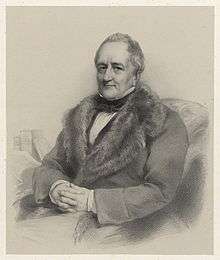William Richard Hamilton
William Richard Hamilton, FRS, (1777–1859) was a British antiquarian, traveller and diplomat. He was the third son of Rev. Anthony Hamilton, Archdeacon of Colchester and Anne, daughter of Richard Terrick, Bishop of London.

Born in St Martin-in-the-Fields, London in 1777, he studied at Harrow School and St John's College, Cambridge.[1] In 1799 he was appointed chief private secretary to Thomas Bruce, 7th Earl of Elgin. He was in Egypt as the British took it over from the French, secured the Rosetta Stone and superintended its transport to England.[2] After a voyage up the Nile, he wrote a well-known work of Egyptology, Ægyptiaca.[3]
From 1809 to 1822 Hamilton served as Permanent Under-Secretary for Foreign Affairs, and from 1822 to 1825 he was Minister and Envoy Plenipotentiary at the Kingdom of the Two Sicilies. In 1830 he succeeded Sir Thomas Lawrence as Secretary of the Society of Dilettanti, a post which he held until his death in 1859.
The geologist William John Hamilton and soldier Frederick William Hamilton were his sons.
Notes
- "Hamilton, William (HMLN795WR)". A Cambridge Alumni Database. University of Cambridge.
- https://www.webcitation.org/query?url=http://www.geocities.com/TimesSquare/Alley/4482/Rosetta.html&date=2009-10-25+11:24:57
- Remarks on Several Parts of Turkey, Part 1: Aegyptiaca or Some Account of the Ancient and Modern State of Egypt Obtained in the Years 1801-02, (1809)
